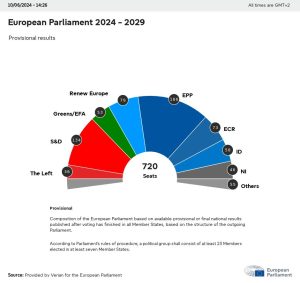EU elections 2024: Pro-crypto parties pick up seats amid Green losses
(Coins Telegraph)-12/06/2024
From June 6 to 9, more than 185 million people from the European Union’s 27 member states voted for candidates to serve a five-year term in a new European Parliament, the legislative branch of the political bloc.
This pivotal event will shape the political direction of the EU for five years, and crypto and blockchain are no exception.
The election results are mixed: The Christian Democrats won 10 seats, while the Social Democrats hung on, losing only four seats, and the pro-business (and pro-crypto) Renew Europe Group lost 23 seats.
The Greens also took a beating, losing 18 seats, while far-right parties made notable gains.
So, what plans do these parties have for the crypto and blockchain industries?
Cointelegraph reviewed the election manifestos of various parties and interviewed a number of members of the European Parliament about their plans for the future.
European People’s Party (EPP), or Christian Democrats — 186 seats (gained 10)
The EPP Group, the largest and one of the most influential political groups in the European Parliament, generally holds a cautious yet forward-looking stance on cryptocurrencies, the digital euro and blockchain technology.
The group recognizes the transformative potential of blockchain and digital currencies in enhancing financial services and economic efficiency. However, it emphasizes the need for robust regulatory frameworks to prevent misuse, ensure consumer protection and maintain financial stability.
MEP Stefan Berger, a member of the EPP Group who helped negotiate the EU’s major crypto regulation — Markets in Crypto-Assets (MiCA) — told Cointelegraph:
“Crypto assets are gaining importance and have their place as a complement to the traditional financial system. We see crypto assets as forward-looking technologies with diverse possibilities for consumers and businesses and support balanced regulation that allows room for further development and innovation.”
The EPP supports the current MiCA law but also sees the potential for future adjustments. Berger said, “MiCA creates trust in the industry, provides security for founders and offers the European Economic Area a significant competitive advantage. It is clear that in the future, we will also need a legal framework for NFTs that benefits consumers and the entire industry.”
The EPP supports a more relaxed tax policy for crypto. Berger said the party wants to “strengthen Europe as an innovation location and reject restricting the adoption of crypto assets through restrictive tax policies.”
The party is also keen to explore the potential of blockchain technology outside of crypto.
“Blockchain can bring efficiency gains in public administration processes and enable new applications. This strengthens citizens’ trust in the state and administration,” said Berger.
Progressive Alliance of Socialists and Democrats (S&D) — 135 seats (lost 4)
The S&D Group is cautiously optimistic about blockchain and cryptocurrencies. The group recognizes the potential benefits of these technologies in promoting financial inclusion and improving public services. However, its primary concern is the regulatory and social implications.
S&D calls for strict rules to prevent fraud, money laundering and tax evasion. It supports the idea of a digital euro, seeing it as a tool to increase the effectiveness of monetary policy and protect consumers.
Renew Europe — 79 seats won (lost 23)
Renew Europe, a centrist and liberal political group, has been a prominent voice in the European debate on crypto. The group held the rapporteurship for the report on digital finance, which the European Parliament approved in 2020.
Since then, Renew Europe has consistently called for a robust regulatory framework for crypto assets to ensure the EU is ready for structural digital transformations.
Renew Europe also champions a proactive, innovation-friendly approach to blockchain and digital assets. The party views blockchain technology as a key driver of transparency, efficiency and growth across various sectors.
The group supports developing and establishing a digital euro, which it sees as essential for maintaining the European Union’s competitiveness in the digital age. Renew Europe describes the digital euro as “an ambitious project that should preserve public money as a monetary anchor, strengthen Europe’s strategic autonomy in the payments sector and promote financial inclusion.”
Additionally, Renew Europe strongly advocates for a European digital identity. The party believes that a secure and universally recognized digital ID system will enhance trust in digital transactions, streamline administrative processes and improve access to public and private services.
European Conservatives and Reformists Group (ECR) — 73 seats (gained 4)
The ECR Group holds a pragmatic and cautious view on cryptocurrency, reflecting its broader conservative and reformist principles.
The group sees blockchain and cryptocurrencies as promising tools for economic growth and modernization. According to the ECR, these technologies could make Europe’s financial sector more competitive and efficient, benefiting businesses and consumers alike. It believes cryptocurrencies should be integrated into a diverse financial ecosystem and support the MiCA regulation
However, the ECR supports stringent Anti-Money Laundering measures to combat the misuse of cryptocurrencies. It also calls for robust cybersecurity measures to defend against hacking and other threats.
The ECR is skeptical about a digital euro, calling it “a solution looking for a problem” and attributing the popularity and rise of cryptocurrencies to what it describes as irresponsible monetary policy.
The group argues that existing solutions, such as instant payments, already offer the benefits touted by proponents of a digital euro without the associated risks or complications.
Identity and Democracy (ID) — 58 seats (gained 9)
While the ID Group, known for its populist and nationalist tendencies, does not have an official stance on digital currencies and blockchain, member parties such as Germany’s Alternative for Germany (AfD) have some thoughts, at least on a digital euro.
The AfD sees the euro as fundamentally flawed and unable to sustain a union of 20 diverse economies. The party thinks that euro bailouts, often at Germany’s expense, are further evidence of its structural inadequacy.
The AfD opposes the introduction of a digital euro by the European Central Bank. The party sees it as a threat to cash, which is essential to protecting individual freedom and privacy from government overreach and surveillance. The party advocates for the preservation of cash as a constitutional right, fearing that a digital euro could undermine this fundamental liberty.
In contrast, Marine Le Pen of France’s National Rally (also a member party of the ID Group) has softened her stance despite a history of skepticism toward cryptocurrencies.
After initially calling for a ban on Bitcoin in 2016, Le Pen now supports strict regulation rather than an outright endorsement of crypto or blockchain technology.
Greens/European Free Alliance (Greens/EFA) — 53 seats (lost 18)
The Greens/EFA Group has no overarching policy on cryptocurrencies or blockchain.
Paul Butcher, an EFA policy adviser, explained to Cointelegraph: “As a European political party, we are an alliance of our member parties, which have different views on the subject or have not developed policies on the sector. As a result, we have not yet discussed this issue at our General Assemblies or at the EFA Congress, where our 2024 manifesto was developed.”
However, the EFA supports the principle of subsidiarity and the MiCA regulation. Butcher said the party welcomes MiCA “as a starting point for a European-wide regulatory framework on crypto assets, which by their nature cross borders and cannot be adequately regulated at the national or regional level alone.”
“However, when it comes to taxation and specific measures to promote the sector, we seek to safeguard the right of the member states and regions to legislate in these areas.”
The EFA also recognizes the potential of crypto assets to give individuals greater freedom and ownership over their financial affairs. Butcher added: “We support this competition in the traditional banking sector and would like to see it develop in line with appropriate regulations to ensure that investors are protected while still being able to choose self-custody if they so wish.”
The Greens/EFA Group takes a cautious and socially conscious stance on blockchain. It acknowledges its potential for enhancing transparency and sustainability in various sectors, such as supply chain management and energy.
However, it is wary of the environmental impact of certain cryptocurrencies, particularly those relying on energy-intensive consensus mechanisms, such as proof-of-work.
The Greens/EFA Group supports exploring a digital euro, provided it aligns with sustainability goals and contributes to social welfare.
The Left in the European Parliament (GUE/NGL) — 36 seats (lost 1)
The Left is critical of cryptocurrencies, expressing concerns over their potential to facilitate illicit activities and exacerbate economic inequality. It is wary of the speculative nature of cryptocurrencies and the risks they pose to financial stability.
According to the Left, “crypto assets are an ecological disaster.” The German Left party’s election manifesto calls for banning Bitcoin and crypto mining to save energy.
MEP Chris MacManus (Ireland) said he had “no interest in creating a market for or in fostering the use of crypto assets,” adding that “at their worst, they are pyramid schemes, or used by criminal gangs for money laundering, or defrauding working people, and they can waste huge amounts of energy for no purpose.”
“I see little or no social or economic benefit to these tools of speculation. I accept the reality that crypto assets exist, and short of banning them, they must be regulated.”
The Left supports a digital euro designed to enhance public control over the monetary system and promote economic justice. It advocates for strict regulatory measures to curb speculation, protect consumers and ensure digital financial innovations serve the broader public interest.
Non-Inscrits
Non-Inscrits are MEPs who do not belong to one of the recognized political groups listed above.
Volt Europa — 5 seats won (plans to join Renew in EU Parliament)
Volt Europe, a pro-European federalist party focused on innovation and digital rights, holds a progressive stance on cryptocurrencies.
It believes cryptocurrencies are significant within the traditional financial system and advocates for protecting users’ digital rights while ensuring compliance with financial regulations. Pauline Raabe, who handles public relations for Volt Europe, told Cointelegraph:
“Cryptocurrencies are already intertwined with the traditional financial system, as evidenced by the recent emergence of Bitcoin [exchange-traded funds]. As such, it is an asset class that is here to stay, and therefore, our main concern is its impact on society and the economy.”
Volt supports the introduction of a digital euro without limits and with remuneration to foster competition in the market for deposits and payment services. Its approach to regulation, including MiCA, emphasizes the need for clarity and consistency across the EU to avoid unnecessary red tape for investors and companies.
Regarding taxation, Volt proposes treating crypto investments like any other investments. It aims to harmonize European investment regulation to create an integrated market for financial investments. As part of this harmonization effort, the party supports the creation of mutual funds and exchange-traded funds with crypto assets.
Regarding blockchain technology, Volt sees its potential applications in digital identities, e-health and certificate diffusion. It advocates for further research and development to advance the cryptographic foundations of blockchains and support innovative firms exploring their real-world applications.
“Volt wants to triple the budget of the Horizon Europe program. To facilitate innovative startups, Volt strives to establish a full-scale European venture program and to support entrepreneurs in fitting into the regulatory framework of the EU by, for example, creating regulatory sandboxes.”
European Christian Political Movement (ECPM) — 4 seats won
According to Adriana Rus, the ECPM’s communications manager, the party generally supports technological progress as long as it “does not threaten human dignity and fundamental rights, such as the right to privacy and freedom of speech, and the environment is not harmed.”
Some ECPM members are particularly critical of initiatives like the European digital wallet and eID, believing they compromise privacy and anonymity. However, beyond these concerns, the ECPM has not established a detailed policy on cryptocurrencies.
Balancing innovation with regulatory oversight
The newly elected European Parliament will significantly influence the future of cryptocurrency and blockchain technology in the EU. Each political group has a different perspective: The EPP Group favors balanced regulation to support growth and innovation, while the S&D Group prioritizes strict rules to prevent misuse and supports the development of a digital euro. Renew Europe advocates for a proactive stance on digital assets, pushing for a digital euro and a European digital identity.
Given the Parliament’s diverse composition, debates and potential adjustments to frameworks like MiCA are expected. The presence of far-right and conservative parties adds complexity, with some skeptical of the digital euro and prioritizing stringent Anti-Money Laundering measures. Meanwhile, smaller groups like the Greens and the Left emphasize environmental concerns and social justice in digital finance.




